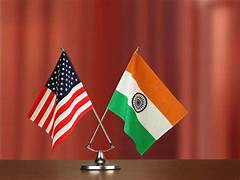Published on: June 28, 2023

India-U.S. digital trade
India-U.S. digital trade

Why in news? The Washington-based Computer & Communications Industry Association (CCIA), which has Google, Uber, Meta, Amazon, amongst others, as its members, has identified 20 policy barriers to US-India digital trade.
Highlights:
- The amendment to the IT Act, imposes additional requirements under the Intermediary Rules (2021), the Content Moderation Act, the equalisation levy, and the proposed Telecom bill are the barriers according to CCIA.
- India-US strategic partnership and ongoing efforts to deepen the economic and commercial engagement between the two countries, including through the Initiative on Critical and Emerging Technology (iCET) and the Indo-Pacific Economic Framework (IPEF).
What is the current status of India-U.S. technology trade?
- Despite the U.S. digital services export sector and enormous growth potential of the online services market in India, the U.S. ran a $27 billion deficit in trade in digital services with India in 2020
- India’s guidelines on the sharing of geospatial data, accuses of providing preferential treatment to Indian companies over US companies
What taxation measures has the CCIA raised concerns about?
- Equalization Levy : ‘Equalisation Levy 2.0’, imposes a 2% tax on gross revenues received by a non-resident e-commerce operator raised questions of constitutional validity and compliance with international obligations
- IT Rules 2021: It raised the “impractical compliance deadlines and content take-down” protocols, the IT Rules require intermediaries to take down content within 24 hours upon receiving a government or court order.
- Major criticism against the government’s institution of the three-member Grievance Appellate Committees (GAC), to reverse content related decision raises the concern
- Digital Competition Act: CCIA raises concern over the act over estimated taxes for big or significant digital intermediaries, arguing that the proposal “to be largely targeted at U.S. tech companies”
- Draft Telecom bill: Draft Telecommunications Bill, 2022 proposed law if passed in its current form, would subject a number of platforms to “onerous obligations including licensing requirements, government access to data, encryption requirements, internet shutdowns, seizure of infrastructure, and possibly monetary obligations for the sector”
- Data protection law: New draft has only one line about cross-border data flows Section 17 of the Act says that cross-border flow of data will only be allowed for a list of countries notified by the Centre. Whitelisting some countries for allowing data transfers would mean that other countries are automatically blacklisted are some of the concerns raised
Recent Efforts by India and US to Ramp up their Tech Partnership:
- Initiative on Critical and Emerging Technology (iCET): Announced by the US President and Indian PM in 2022, India and the U.S. agreed (under the iCET) to cooperate on critical and emerging technologies in areas including
- Artificial intelligence,
- Quantum computing,
- Semiconductors and wireless telecommunication.
- Additionally, India and the U.S. also established a Strategic Trade Dialogue with a focus on addressing regulatory barriers and aligning export controls for smoother trade and “deeper cooperation” in critical areas.
- Semiconductor Supply Chain and Innovation Partnership: It includes a combined investment valued at $2.75 billion.
- On the telecommunications front, two Joint Task Forces to focus on the Open RAN network and R&D in 5G/6G technologies.
- Quantum Coordination Mechanism (to harness future tech such as AI and Quantum Computing) and a joint fund for the commercialization of Artificial Intelligence.
Way forward
- The United States and India each left unaddressed, fundamental disagreements over issues like digital privacy can lead to regulatory or technical fractures that impede data flows and undermine cooperation. Data sharing under the right regulatory frameworks in other areas, such as health care or cybersecurity, could help citizens while promoting privacy in both countries.

